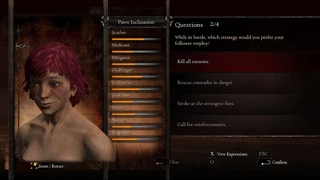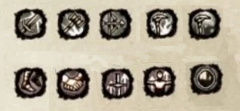Pawn Inclination are a characteristic of pawns that affect their behaviors in the field and in battle. Inclinations can vary from bravely aggressive, protective of other pawns and the Arisen, to cautious or adventurous. There are nine possible inclinations.
Inclinations are an easily overlooked and important aspect of pawn behavior - the interactions can be complex, and the outcomes also may depend on other factors such as vocation.
Overview[]

Inclinations questions during Pawn creation
A Pawn's inclination assists in dictating the behavior of a Pawn, mostly when in combat. Main Pawn inclinations are initially decided by answering questions during character creation. Inclinations can be modified at any time by using the Knowledge Chair found at Inns and Rest Camps, or directly and most efficiently by using Inclination Elixirs which are purchased from Johnathan in the Encampment.
The primary and secondary inclinations are shown in the stats menu in-game under "Profile".
Inclinations generally only affect likely actions but in a few cases introduce new behavior. Generally, inclinations cause prioritization of related actions when there are multiple actions available to the Pawn.
It is thought that only the Primary and Secondary inclinations affect behavior. Depending on circumstances the primary inclination may override the second or the pawn may alternate between the two behaviors. In some cases only having an inclination in the primary spot will unlock certain behaviors. The effect of the "Tertiary" or the other lower ranked inclinations on behavior is unknown but it is likely that they are ignored.
Altering Inclination[]
Temporal and battle effects[]
Inclinations change periodically over time - there are four main causes of changes to a pawn's inclinations:
- Battle actions - these can include : the type of enemy attacked first, enemies slain, or actions such as grappling * .
- Debilitation and healing - becoming debilitated, curing ailments, taking great damage, and restoring health.
- Pawn commands - each of the three pawn commands "Go", "Come", and "Help" will modify some inclination's likelihoods; the effects sometimes depend on whether the commands are issued in battle.
- Hired pawns and their inclinations - the Arisen's main pawn will slowly drift towards hired pawn's inclinations over time (Hired Pawn inclinations do not alter over time).
For each type of action, inclinations can only be raised a certain amount over a fixed period of time. Once that period is over the first new action may raise an inclination again. Because of this, defeating many enemies in short order may have a minimal effect on inclinations, whereas a long drawn out battle with the same foes can alter inclinations far more.
Some other actions such as picking up loot affect specific inclinations each time the action is performed.
Knowledge Chair[]
Whilst talking in the Knowledge Chair a pawn may ask which of two inclinations to prioritize: this swaps the Secondary inclination and the otherwise invisible 'Tertiary' inclination. This action also slightly reinforces the Primary inclination and slightly disfavors all the others.
- If either Primary or Secondary inclination spot is not filled, the Pawn will propose the inclination with the highest score to fill that spot.
Inclination Elixirs[]
Consuming a single inclination elixir promotes the associated inclination to Secondary, or if it was already the Secondary inclination, promotes it to Primary. Taking more inclination elixirs for a behavior already in the primary position reinforces its position as well as lowering other inclinations.
The Neutralizing Elixir resets all inclinations to a middle value.
Effects[]
Inclinations primarily affect pawn behavior (i.e. 'AI'), mostly in battle.
Vocation effects[]
A pawn's Vocation can have a major effect on the behavioral effects of a specific inclination. For example :
- Spellcaster pawns with Medicant will cast spells that cause Invigoration (and others like Necromancy) before battle stars as soon as a foe is spotted.
- Scather can indirectly cause climbing in some battle since it usually causes the targeting of climbable creatures.
Speech and other actions[]
A pawn's inclination is thought to affect the victory poses used by pawns, as well as other signals they use such as waving or beckoning. Their celebratory outbursts are affected by guidance given in the Knowledge Chair, not inclinations.
Pawns will also indicate their inclinations in battle, such as a Challenger pawns stating "The Ranged ones are mine!", and so on.
Inclinations[]
| Inclination | Increased by | Decreased by | Effects |
|---|---|---|---|
| Scather |
Attacking stronger melee foes first. |
Doing nothing for 20 seconds in the presence of powerful foes.
Avoiding enemy contact in battle. |
"Realigns a pawn's inclination that he might readily pursue the strongest foes." Battles large or giant foes first. |
| Medicant |
Arisen is healed at low health (≤35%) or status is restored via consumable or spell (excluding pawn spells). Using the "Come" command out of combat. |
Being at low health (≤35%) for two minutes. |
"Realigns a pawn's inclination that he might fight with heed to Health and Stamina." Prioritizes healing and pre-battle preparations.
The threshold for healing with curatives is raised to a higher level of remaining health : ~60% vs 45% for pawns, 80% vs 60% for the Arisen. (When aid is requested with "Help" they will heal to an additional 15 or 20% more health as well.) [Note: Medicant primary pawns only show this behaviour at elevated medicant inclinations - but two or more elixirs should be enough.]
On being alerted to a foe only pawns with Medicant will prepare for battle before it begins and before the foes are alerted - these actions include: unsheathing weapons; casting elemental enchantments on the party; using protection skills and spells such as Steel Will or Spellscreen.
A pawn's use of Anodyne appears to be unaffected by inclinations. Mages of any inclination will heal any 'white' damage with Anodyne when they have an opportunity, no matter how minor. |
| Mitigator | Attacking weaker melee foes first. | Targeting ranged attackers and spellcasters first. |
"Realigns a pawn's inclination that he might first wipe out the least dangerous of any group." Attacks the weaker enemies first. |
| Challenger | Attacking foes that use projectiles and magic-based attacks first. | Targeting weaker melee foes first. |
"Realigns a pawn's inclination that he might go after foes wielding ranged weapons or magicks." Prioritizes ranged attackers and magic-using foes above others. |
| Utilitarian |
Using support based skills, such as Launchboard or Shield Summons, as well as supportive actions like Grappling or Enchanting weapons during combat. |
Party member debilitated in battle.
Not using tactical skills in battle. * |
"Realigns a pawn's inclination that he might focus on strategies to give his allies advantages." Unknown effect on pawns' actions. ‡ It has been suggested that Utilitarian encourages pawns with Bestiary knowledge to 'call out' corresponding actions that other pawns then act on.(verify) |
| Guardian | Using the "Come" command in combat.
Using the "Help" command in combat. |
Using the "Go" command in battle. |
"Realigns a pawn's inclination that he might act to keep the Arisen from danger above all else." Pawn stays near the Arisen and only attacks foes that enter their close quarters. If the Arisen climbs a creature the pawn will attack it too, including ranged attacks. |
| Nexus |
Arisen: - Player is healed or cured of debilitation during combat with elevated threat. -Aiding pawns in battle.
- Using group curatives or spells to heal pawns at critical health. - Using group curatives or spells to clear a pawn's debilitation. |
Maintaining distance from the party in battle.
Being grabbed by foes. |
"Realigns a pawn's inclination that he might make his fellow pawns' safety his highest priority." Pawns with Nexus as 1º or 2º will carry Unconscious pawns to the Arisen. Pawns with 1º are more likely to carry. Without Nexus or Medicant, they are more likely to be left to return to the rift unless "help" is requested. Nexus pawns will enter battle with other non-Nexus pawns. |
| Pioneer | Using the "Go" command when not in combat. | Taking the lead of the party.
Standing still. |
"Realigns a pawn's inclination that he might ever travel far and wide to seek out new locations." With Pioneer as 1º the pawn will travel much further away than with any other inclination (out of battle). 2º makes the pawn stand at a short distance but doesn't cause wandering. A Pioneer pawn will tend to stray into combat first in many situations. Additionally, Pioneer 1º with Acquisitor 2º seems to cause unique distant gathering behavior. Pioneer pawns also may target inanimate objects like crates in battle and not do so without the inclination. |
| Acquisitor | Arisen picking up items.
(Gathering, opening Chests, and letting pawns pick up items have no effect.) |
Not picking up items, allowing them to dissapear. |
"Realigns a pawn's inclination that he might seek out and collect hidden items, even during battle." Only pawns with Acquisitor will interrupt battle actions to collect loot from foes. Causes special gathering behavior with 1º Pioneers. |
- Generally Utilitarian inclination's score always decreases in battle.
- ‡ May actually function as a neutral inclination - exact effects are unknown. One possibility is that it causes priority use of known Bestiary actions.
Pawn chatter[]
Pawns indicate their specific inclination behavior by shouting various lines of dialogue. Several examples are:
Scather
- "I'll leave the weak foes to you."
- "I'll begin with the strongest."
- "The first strike shall be mine!"
Challenger
- "The ranged ones are mine!"
- "I'll take down the most troublesome of them."
Mitigator
- "I'll take care of the weak."
- "Leave these to me."
- "I'll get the weaklings out of the way."
Medicant
- "Think well before striking."
- "Just wait, we'll see a weakness."
Utilitarian
- "I'll support you!"
- "You've my support."
- "This should change the stakes."
Nexus
- "I'll give aid."
- "I'll bolster our defenses."
- "I'll not allow harm to befall my allies."
Guardian
- "I'll protect you Arisen."
- "Arisen, I am at your side."
- "Any that would target the Arisen are mine!"
Acquisitor
- "That item is mine."
- "Never mind the monsters, I'll take the loot!"
Troubleshooting[]
The only inclination that is incompatible with certain parties is Guardian. Specifically, a Guardian pawn will not attack if the Arisen is not threatened by melee attacks, making it generally incompatible with distant attacking styles including bow, longbow, magick bow, and ranged spellcasting. The problem is further compounded by the Guardian attracting random foes to the Arisen's vicinity which is especially troublesome when said monster is a club wielding cyclops. (Guardian is generally good support for Arisen melee vocations like Fighter and Warrior.)
Nexus can cause similar behavior to Guardian though it is rarely so problematic, the Nexus pawn will actively battle as long as the other pawns are in battle. The exception is if all the other pawns are Guardian which leads to all of them congregating around the Arisen. This becomes a problem if the Arisen is a ranged attacker.
Many perceived pawn behavior problems including unnecessary/inappropriate climbing, excessive rolling, constantly running away or around, and canceling spells before completion cannot be fixed by tweaking inclinations.
| Behaviour | Cause and solution |
|---|---|
| "My pawn keeps turning into a Nexus!" | It is thought that Nexus increases when curatives are used with a debilitated pawn in the party, even if the pawn is not cured.
Critical injuries also increase Nexus. Prevention or rapid cure is the best solution. |
| "My pawn keeps turning into a Guardian!" | Caused by use of the "Help" command (often to request a weapon enchantment).
When in battle the "Come" command in battle also has a similar effect. To get elemental enchantments automatically before battle begins, use a pawn with Medicant 1º or 2º. |
| "My pawn climbs! I don't like this." | Prioritising giant (climbable) enemies can be caused by Scather.
However, no inclination can prevent climbing. |
| "I want my Ranger or Strider to shoot from a distance like a sniper, but they keep rushing in to climb monsters instead!" | There is no inclination that prevents melee attacks. |
| "My Mage interrupts spells to heal all the time! I want them to finish the spell first!" | Can be caused by Medicant prioritizing healing.(verify)
Also caused by heavy damage in battle. |
| "My spellcaster pawn will not enchant my weapon, even when requested with the 'Help' command, sometimes saying 'I cannot do that right now.' " | This occurs when the spellcaster is in the process of casting another spell when the request for aid is received.
Not inclination related. Try again in a few moments. |
| "My spellcaster pawn enchants my weapon at the end of battles but not before." | This is due to the pawn having been very busy during battle; they queue requests for aid but may not be able to complete them until the battle is over. |
| "My pawn keeps cancelling spells before they finish." | There are two causes for this behaviour :
|
Creature associations[]
Most types of foes are associated with an inclination type. In general :
- Mitigator corresponds to small foes.
- Challenger corresponds to ranged foes including spellcasters, bow users, and stone throwers.
- Scather corresponds to giant foes including giant Saurians and Poisoned Undead.
Pawns of a specific inclination will only attack a creature matching their favored inclination when present.
Battle actions such as the first foe targeted raise the inclination associated with that foe and similarly raise when those foes are defeated, though in some cases the inclination change depends on the type of attack used: e.g., a Wraith defeated by ranged attacks promotes Challenger, however a Wraith defeated by melee attacks promotes Scather.
Additionally, the classification of foes in terms of inclination change may also depend on the other enemies present; killing a Dire Wyrm may promote Mitigator in the presence of a stronger Dire Drake, but if the Drake is defeated then killing the Wyrm promotes Scather.
However, attacks on different Chimera heads are thought to promote certain inclinations (Lion - Scather, Snake - Mitigator, Goat - Challenger), the reverse is not true; Challenger pawns do not seem to specifically target the Goat's head; instead, Bestiary knowledge promotes attacking the Snake head first.
Skill use[]
- Main article: Pawn skill use.

Skill types :
[First row] Slashing , Bashing , Ranged , Magick (attack) , Magick (support)
[Second row] Mobility , Auxillary action (support) , Weapon enhancement , Status enhancement , Defensive
Skills are each categorized according to a small set of types, such as Slashing, attack Magick, Mobility, Defensive etc; and spells are additionally sub-categorized by element type - the effect Inclination has on skill use is unknown.
Skill use is known to be heavily influenced by known Bestiary effects (eg Pawns with Lightning spells will use them almost exclusively against Cyclops), as well as by the general enemy type (eg Pawns with Dazzle Blast or Shriek Dart will use these very heavily against bandits). However there may be cases where Inclination does direct skill choice. Possible examples include the use of support spells by Medicant pawns.
Notes[]
- Pawn commands temporally override Pawn inclinations. For example, a Nexus pawn will target a foe near the Arisen when "Help" is requested but once the foe is slain they return to their pawn allies.
- With Scather or Nexus as 1º, pawns stand further away from the Arisen when idling. In the 2º position there is no effect. Pioneer as 1º or 2º has the same distancing effect. All other inclinations cause the pawn to stand right next to the Arisen.
- When a pawn triggers a Great Cannon sigil with their own attacks Utilitarian is raised.
- Occasionally the pawn AI will experience a random glitch or bug where one inclination will be instantly promoted. This is theorized to be a residual effect carried over from old data; this can happen when Pawn rentals are received or in response to a D-pad order.(verify)
Doesn't affect inclinations:[]
- Use of stamina curatives isn't known to increase or decrease any inclination.
- Picking up objects raises Acquisitor; opening chests or gathering does not.
- Bestiary knowledge actions during battle do not increase Utilitarian.
- Pawn commands affect inclinations once every half minute. Spamming the command button during that period is no different from pressing it once in terms of inclination change.
- There's a limit to the increase from some pawn commands; for example, "Go" only increases Pioneer to 70% of its maximum value after which Pioneer is no longer promoted.
- Sneak attacks when foes are not alerted to the party's presence have no effect on inclination.
- Fully draining stamina doesn't affect inclinations.
- A pawn's inclination will not change whilst being hired (however hired pawn's inclinations may have a small effect over time on that of the Main Pawn).
See also[]
- For an even more detailed look see Pawn Inclination : Under the Hood
